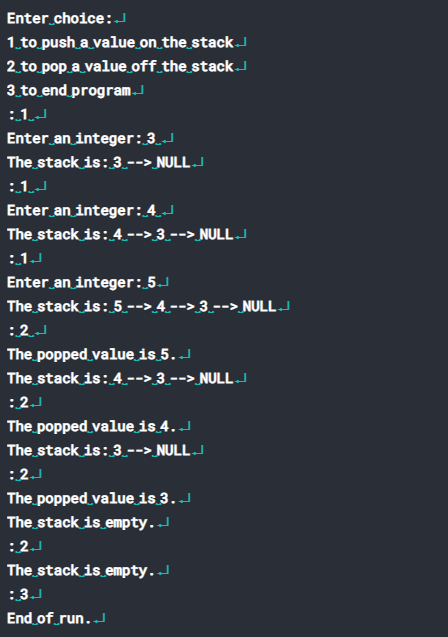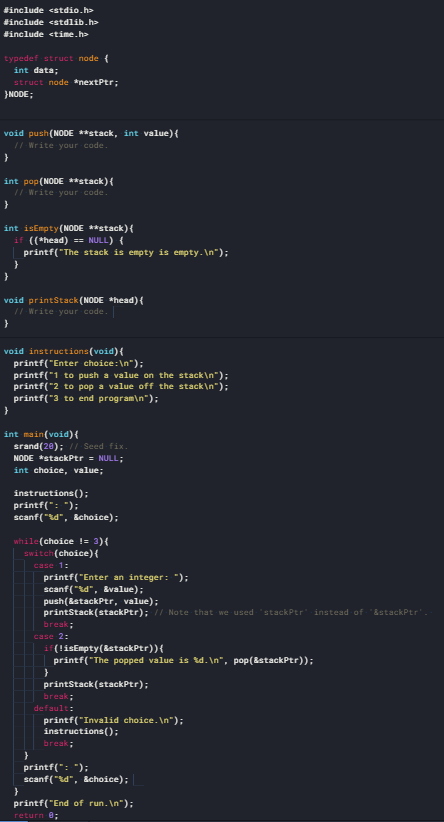Create a C function that takes a stack using linked lists.
C++ Programming: From Problem Analysis to Program Design
8th Edition
ISBN:9781337102087
Author:D. S. Malik
Publisher:D. S. Malik
Chapter18: Stacks And Queues
Section: Chapter Questions
Problem 21SA
Related questions
Question
Create a C function that takes a stack using linked lists.
Fill in the "Write your code" sections appropriately.

Transcribed Image Text:Enter choice:
1.to push a value on_the stackJ
2 to pop a value off_the_stack.J
3.to end program
:1J
Enter an integer:3.
The stack is:3.--> NULLJ
:1J
Enter an integer:4.J
The stack is: 4.--> 3.--> NULLJ
:1J
Enter an integer: 5.J
The stack is: 5.--> 4 --> 3.--> NULL .d
:2J
The popped value is 5. J
The stack is: 4--> 3 --> NULL
:2J
The popped value is 4.J
The stack is: 3.--> NULLJ
:2J
The popped value is 3.
The stack is empty.
:2J
The stack is empty.
:3J
End of run..

Transcribed Image Text:#include <stdio.h>
#include <stdlib.h>
#include <time.h>
typedef struct node {
int data;
struct node *nextPtr;
}NODE;
void push(NODE **stack, int value){
// Write your code.
int pop(NODE **stack){
// Write your code.
int isEmpty(NODE **stack){
if ((*head) == NULL) {
printf("The stack is empty is empty. \n");
void printStack (NODE *head) {
// Write your code.
void instructions(void){
printf("Enter choice:\n");
printf("1 to push a value on the stack\n");
printf("2 to pop a value off the stack\n");
printf("3 to end program\n");
int main(void){
srand(20); // Seed fix.
NODE *stackPtr = NULL;
int choice, value;
instructions();
printf(": ");
scanf("d", &choice);
while(choice != 3){
switch(choice){
case 1:
printf("Enter an integer: ");
scanf ("d", &value);
push(&stackPtr, value);
printStack (stackPtr); // Note that we used stackPtr instead of &stackPtr'.
break;
case 2:
if (!isEmpty(&stackPtr)){
printf("The popped value is d. \n", pop(&stackPtr));
printStack(stackPtr);
break;
default:
printf("Invalid choice. \n");
instructions():
break;
printf(": ");
scanf ("d", &choice);
printf("End of run. \n");
return e;
Expert Solution
This question has been solved!
Explore an expertly crafted, step-by-step solution for a thorough understanding of key concepts.
This is a popular solution!
Trending now
This is a popular solution!
Step by step
Solved in 2 steps with 5 images

Knowledge Booster
Learn more about
Need a deep-dive on the concept behind this application? Look no further. Learn more about this topic, computer-science and related others by exploring similar questions and additional content below.Recommended textbooks for you

C++ Programming: From Problem Analysis to Program…
Computer Science
ISBN:
9781337102087
Author:
D. S. Malik
Publisher:
Cengage Learning

C++ Programming: From Problem Analysis to Program…
Computer Science
ISBN:
9781337102087
Author:
D. S. Malik
Publisher:
Cengage Learning